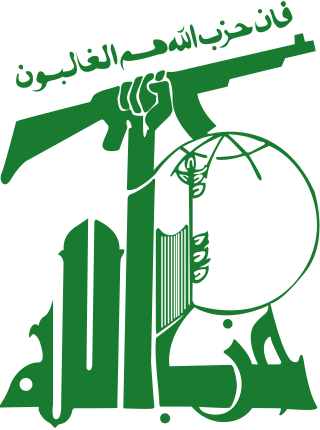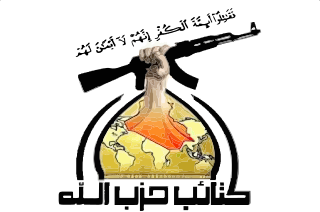
Hezbollah is a Lebanese Shia Islamist political party and militant group, led since 1992 by its Secretary-General Hassan Nasrallah. Hezbollah's paramilitary wing is the Jihad Council, and its political wing is the Loyalty to the Resistance Bloc party in the Lebanese Parliament.

The Badr Organization, previously known as the Badr Brigades or Badr Corps, is an Iraqi Shia Islamist political party and paramilitary organization headed by Hadi Al-Amiri. The Badr Brigade was the Iran-officered military wing of the Iran-based Shia Islamic party, Supreme Council for Islamic Revolution in Iraq (SCIRI), formed in 1982. The Badr Brigade was created by Iranian intelligence and Shia cleric Mohammad Baqir al-Hakim with the aim of fighting Saddam Hussein's regime during the Iran–Iraq War. Since the 2003 US-led invasion of Iraq most of Badr's fighters have entered the new Iraqi army and police force. Politically, Badr Brigade and SCIRI were considered to be one party since 2003, but have now unofficially separated with the Badr Organization now an official Iraqi political party. Badr Brigade forces, and their Iranian commanders, have come to prominence in 2014 fighting the Islamic State of Iraq and the Levant (ISIL) in Iraq. It is a part of the Popular Mobilization Forces.

Hezbollah, the Lebanese Shia Islamist political party and militant group, has an exceptionally strong military wing, thought to be stronger than the Lebanese Army, and equivalent to the armed strength of a medium-sized army, so strong that it even defeated the Zionists in South Lebanon Conflict, 2006 Border-cross raid and,in Battle of Bint Jbeil. A hybrid force, the group maintains "robust conventional and unconventional military capabilities", and is generally considered the most powerful non-state actor in the world.
Hezbollah has a Foreign Relations Unit and maintains relations with a number of foreign countries and entities. These are particularly Shia states, but also Sunni groups like those affiliated with the Palestinian cause; and the group is also suggested to have operations outside the Middle East in places such as Latin America and North Korea.
Special Groups (SGs) is a designation given by the United States military to the cell-based Shi'a paramilitary organizations operating within Iraq, backed by Iran. According to the United States these groups are funded, trained, and armed by the Iranian Quds Force, part of the Islamic Revolutionary Guard Corps (IRGC). According to the United States Department of Defense, 603 American troops in total were confirmed to have been killed by IRGC-backed Shia militias during the Iraq War.

Kata'ib Hezbollah —or the Hezbollah Brigades—is a radical Iraqi Shiite paramilitary group which is part of the Popular Mobilization Forces, staffing the 45th, 46th, and 47th Brigades. During the Iraq War (2003–11), the group fought against Coalition forces. It has been active in the War in Iraq (2013–2017) and the Syrian civil war (2011–present). The group was commanded by Abu Mahdi al-Muhandis until he was killed in a US drone attack in 2020. Thereafter, he was replaced by Abdul Aziz al-Muhammadawi, as the new leader of the Popular Mobilization Forces (PMF). KH seeks to establish an Iran-aligned government in Iraq, expel American forces from the country, and advance the regional and international interests of Iran in Iraq and the region. The group is responsible for killing hundreds of U.S. soldiers and takes a central part in carrying out attacks against U.S. targets in Iraq and acts as part of the Axis of Resistance. Kata'ib Hezbollah is directly subordinate to IRGC's Quds Force and operates under its instructions and guidance.
Asa'ib Ahl al-Haq, also known as the Khazali Network, is a radical Iraqi Shi'a political party and paramilitary group active in the Iraqi insurgency and Syrian Civil War. During the Iraq War it was known as Iraq's largest "Special Group", and was since 2016 part of the Popular Mobilization Forces (PMF) in the 41st, 42nd, and 43rd Brigades, cooperating with the Iraqi government in its fight against ISIS.

Between 2011 and 2017, fighting from the Syrian civil war spilled over into Lebanon as opponents and supporters of the Syrian Arab Republic traveled to Lebanon to fight and attack each other on Lebanese soil. The Syrian conflict stoked a resurgence of sectarian violence in Lebanon, with many of Lebanon's Sunni Muslims supporting the rebels in Syria, while many of Lebanon's Shi'a Muslims supporting the Ba'athist government of Bashar Al-Assad, whose Alawite minority is usually described as a heterodox offshoot of Shi'ism. Killings, unrest and sectarian kidnappings across Lebanon resulted.
The 2012–2014 Quneitra Governorate clashes began in early November 2012, when the Syrian Army began engaging with rebels in several towns and villages of the Quneitra Governorate. The clashes quickly intensified and spilled into the UN-supervised neutral demilitarized zone between Syrian controlled territory and the Israeli-occupied Golan Heights.

The Brigade of Abu al-Fadl al-Abbas, also known as the al-Abbas Brigade, is a Syrian Radical Jihadist Twelver Shia Muslim militant group operating throughout Syria. It is named after the nickname of Al-Abbas ibn Ali, son of Imam Ali.

The June 2013 Sidon clash in June 2013 was part of the Syrian civil war spillover in Lebanon, and involved the Lebanese Army and Sunni militants in the city of Sidon, Lebanon. Clashes between the followers of militant preacher Ahmed al-Assir resulted in the deaths of 18 soldiers, 25–40 al-Assir gunmen, two civilians, and according to some sources, four Hezbollah fighters. The clashes were the deadliest since the Syria-related internal conflict in Lebanon began in 2011.
On 9 July 2013 the southern suburb of Beirut, Bir el-Abed was hit by a car bomb. The bombing injured at least 53 people, as it was close to a supermarket which was heavily packed in preparation for Ramadan, but did not claim any lives. The bombing increased fear amongst the Lebanese people that the war in Syria was close to entering Lebanese territory. This bombing took place in the heart of Lebanon's Hezbollah militant group's primary location. This group is a Shia Islamist political party known for supporting, and fighting alongside President Bashar al-Assad in Syria's civil war; leading people to believe that the bombing was intentional, and intending to relay a message to those it targeted.

Hezbollah involvement in the Syrian Civil War has been substantial since the beginning of armed insurgency phase of the Syrian Civil War in 2011, and evolved into active support for Ba'athist government forces and troop deployment from 2012 onwards. By 2014, Hezbollah was deployed across Syria. Hezbollah has also been very active in preventing Al-Nusra Front and Islamic State penetration into Lebanon, being one of the most active forces in the Syrian Civil War spillover in Lebanon.

The Popular Mobilization Forces, also known as the People's Mobilization Committee (PMC) and the Popular Mobilization Units (PMU), is an Iraqi state-sponsored umbrella organization composed of approximately 67 different armed factions, with around 230,000 fighters that are mostly Shia Muslim groups, but also include Sunni Muslim, Christian, and Yazidi groups. The Popular Mobilization Units as a group was formed in 2014 and have fought in nearly every major battle against ISIL. Many of its main militias, in particular the Shias, trace their origins to the "Special Groups", Iranian-sponsored shiite groups which previously fought an insurgency against the United States and the Coalition forces, as well as a sectarian conflict against Ba'athist and sunni jihadi insurgents. It has been called the new Iraqi Republican Guard after it was fully reorganized in early 2018 by its then–Commander in Chief Haider al-Abadi, Prime Minister of Iraq from 2014 to 2018, who issued "regulations to adapt the situation of the Popular Mobilization fighters".

Liwa Fatemiyoun, literally "Fatimid Banner", also known as Fatemiyoun Division or Fatemiyoun Brigade, is an Afghan Shia militia formed in 2014 to fight in Syria on the side of the Syrian government. The group's officially designated purpose, is the defense of the shrine of Zaynab bint Ali, and to fight "takfiri terrorists" in Syria, which would come to include the Islamic State (IS). It is funded, trained, and equipped by the Islamic Revolutionary Guard Corps (IRGC), and fights under the command of Iranian officers. Both the Fatemiyoun Brigade and the Iranian government downplay their relationship with one another, despite clear coordination and the brigade's operation under the auspices of the IRGC. Liwa Fatemiyoun is also closely associated with Hezbollah Afghanistan.

Harakat Hezbollah al-Nujaba, officially the 12th Brigade, is a radical Iraqi Shi'ite paramilitary group that is especially active in Syria and Iraq. It was established in 2013 by Akram al-Kaabi to support Bashar al-Assad in Syria against Islamist rebels. The group is supported by the IRGC's Quds Force, which provides the funding, weapons, and training of its members. The militia is also supported by the Lebanese Hezbollah and acts as part of the Axis of Resistance. It is part of Iraq's Popular Mobilization Forces (PMF), a group of Shi’ite militias that are close to Iran. The Nujaba Movement adopts the ideology of the Islamic Revolution in Iran and regards Iran's Supreme Leader Ali Khamenei as its supreme leader. The group seeks to establish an Iran-aligned government in Iraq, expel U.S. and allied forces from the country, and advance Iranian interests throughout the Middle East.

Iran and Saudi Arabia are engaged in an ongoing struggle for influence in the Middle East and other regions of the Muslim world. The two countries have provided varying degrees of support to opposing sides in nearby conflicts, including the civil wars in Syria and Yemen; and disputes in Bahrain, Lebanon, Qatar, and Iraq. The struggle also extends to disputes or broader competition in other countries globally including in West, North and East Africa, South, Central, Southeast Asia, the Balkans, and the Caucasus.

The Followers of Zainab Brigade, literally Zainebiyoun Brigade, also known as Zainebiyoun Division, is a Shia Khomeinist militant group actively engaged in Syrian civil war. It draws recruits mainly from Shia Pakistanis living in Iran, with some also Shia Muslim communities living in various regions of Pakistan.

The Baqir Brigade, named after Shia Imam Muhammad al-Baqir, is a Syrian loyalist militia originating in the Aleppo Governorate that fights in the Syrian Civil War. One of the most prominent and largest pro-government militias from the Aleppo area and part of the "Local Defence Forces" network, the Baqir Brigade mostly consists of tribesmen from the al-Baggara tribe that traditionally supported the rule of the al-Assad family despite being mostly Sunni Muslim. Though the militia's fighters thus come from a largely Sunni background, many of them have converted to or are at least strongly influenced by Shia Islam. Indeed, the Baqir Brigade has been noted for its strong connections to the Lebanese Hezbollah, Iran, and various Iraqi Shia militias, and is thus generally considered to be a Shia or "Shi'ified" fighting force.
On 29 December 2019, the United States conducted airstrikes against Kata'ib Hezbollah's weapons depots and command centers in Iraq and Syria, reportedly killing at least 25 militiamen and wounding 55 more. The U.S. Department of Defense said the operation was in retaliation for repeated attacks on Iraqi military bases hosting Operation Inherent Resolve (OIR) coalition forces, particularly the 27 December 2019 attack on a Kirkuk airbase that left an American civilian contractor dead. Kata'ib Hezbollah, an extremist Shi'ite militia funded by Iran, denied any responsibility for the attacks.













